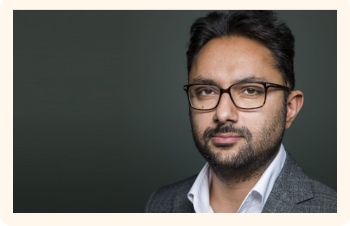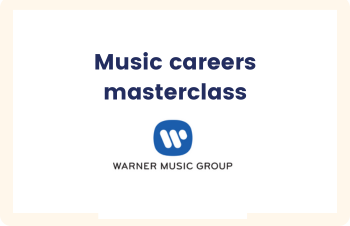Creative Access welcomed us back with the “How-to turbo-charge your career” masterclass last Thursday. Our own April Brown chaired the discussion with Lynn Blades, leadership coach and advocate for a “workforce more representative of our society” as well as football journalist Ahmed Shooble, who has been making waves of his own writing for the likes of The Times and The Athletic. Together they discussed how to take your professional career to the next level, the obstacles that may arise, how to deal with them, and most importantly – the power in self-belief.
With a new year often comes the desire to better ourselves; to elevate, improve and implement changes that our future selves will thank us for. This includes within our work lives – everyone wants to level up, to reach that new position, or to smash goals in an existing one, but the idea of change might be scary. Turbo-charging isn’t about getting somewhere quickly, but more so the small actionable tasks we can undertake to build the ladder to get to that place.
“When you’re focused, and you’re not full of anxiety, you’re able to set goals that are achievable”
Lynn Blades

Ahmed, a Creative Access alum who is now a journalist writing for one of the biggest sports websites in the world, stresses the importance of knowing you are in control. “It’s not a race, but a journey,” he says, as he explains his route into sports journalism. “Know where you want to be, which publication, then figure out whose attention you need to get – work backwards.” It’s so important to show initiative, and know you are in charge of your future. Lynn adds how vital it is to be mindful, taking time to think about your ambitions and achievable goals. Sometimes all that’s needed is a step back to see things as a whole, and look at specific skills you’d like to improve on or acquire.
Networking is key to levelling up. When asked about the importance of networking online, our panellists had lots to share. Lynn, who works with the best and brightest as well as a slew of very impressive companies such as Nike, BBC, and Sony, spoke about LinkedIn. With 74 million viewers, LinkedIn can seem like a never-ending pool of people sharing their achievements, but with only 6 million original posts, it’s vital you make yourself known and celebrate your accomplishments – no matter how small! Ahmed added that it was through keeping contact with someone he’d networked with online, that he found his current job.
“I get jobs on LinkedIn from people who see me as a leader in my field”
Lynn Blades

Ahmed then continues, explaining that his turbo-charge was aided by a journalism degree. This is not to say that this is needed to get into sports journalism, but the lesson here lies in the initiative he used to push himself to get one. “Degrees aren’t essential, I didn’t get one at first”, he explains before sharing his other tips. Employers want to see that you are willing to learn and grow, and a lot of companies offer training in-house – you should take advantage of this if it is available. If specifically looking to get into journalism, Ahmed advises contacting commissioning editors and making sure your pitch is above par. How is this done? By explaining why this is the publication for you, and what ideas you have to offer. “Don’t give everything away” he warns, “lay it out like a conversation”. We learn that pitching can sometimes be brutal, but Lynn adds “if you can’t fail, you can’t succeed” and suddenly failing doesn’t seem so fatal.
Sometimes we can face difficulty on our way to success. Lynn bravely shared her experience of harassment in the workplace, and harrowingly, the little that was done to support her. This was her calling card to leave, and she found several opportunities available to her. She cautions our listeners not to “let a big head take over” and think carefully about the chances we are given. Not every position will be a dream job, but the transferable skills and doors that could open can sometimes make It all worthwhile. April, our chair, spoke of her struggle with the culture of unpaid internships, an issue Creative Access is working tirelessly to change.
“You had to be experienced to get the job, so I did short-term unpaid internships which was really hard to juggle alongside casual work and justifying this to my family.”
April Brown
Ahmed agreed, speaking of his own clashes with imposter syndrome and wondering whether his skin colour was the reason he got the job. 85% of people in positions of power experience imposter syndrome – so an experience that can often leave us feeling inadequate and alone, is a lot more common than you might think, which is even more reason to talk about it and have these difficult conversations with your peers.
“It’s like a seed, it will grow. It’s important that you’re your biggest supporter, not your biggest enemy.”
Ahmed Shooble
Not everyone’s seeds will bloom so openly though, as our audience asked for advice on what to do when feeling lost – an overwhelming emotion that most of us can sympathise with. Our panel reassured us by saying that discomfort is okay! Great things never came from comfort zones, sitting in that discomfort can perhaps teach us what we don’t like, and on top of that, encourage us to go back to basics and ask ourselves – what do we like? What makes us happy? What are our strengths? And build from there. And if you’re looking to change industry, this advice still stands; try sitting, doing some research, and contacting specific individuals in an area you would like to try out.

If big change seems a little too much – start small! Our panel shared some resources they are using to make themselves the best in their respective fields. Reading about what’s going on around you, especially within the field you’re interested in can help you stay in the know. Setting alerts to email bulletins such as Media Beans and Creative Access (shameless plug!) can put you ahead, and can be impressive when cited in an interview. In addition, Lynn shares some apps she uses to stay present in our fast-moving world. She suggests Calm, and regular meditation – there’s strength in steadiness.
“Don’t be so fast. Patience is a virtue. You can have everything but not at the same time”
Lynn Blades
As our discussion came to an end, we broached the subject of the future of the Creative industry. The murder of George Floyd sparked a much-needed cry for justice and resulted in many coming together to both educate themselves and spread awareness of the effects of discrimination. Still, there is a way to go, our panel agrees. “A house divided cannot stand,” Lynn says, and she’s right. BCOMP (The Black Collective of Media in Sport), where Ahmed spent some time during a summer internship, is proof our house is still very much divided, but he expresses the significance of “being the change you want to see”. It might be inevitable that you meet unsavoury individuals, but we are growing into a community that sees the necessity of allyship. The future needs more leaders of colour; individuals who stand as beacons, calling to those who feel as though they’d never make it to positions of power. A lot of companies are missing the mark, which can be frustrating but the talent within the emerging generation is also undeniable. If given the chance, this great talent is ready to do some turbo-charging of its own to the top.
A special thanks to all our panellists and April for chairing an amazing discussion. Watch the recording below.




